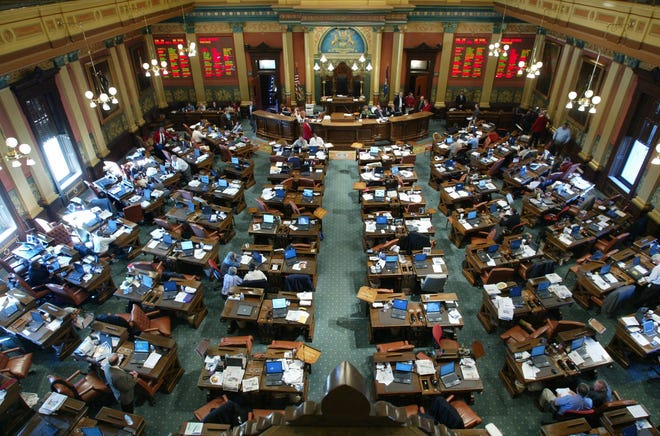The Michigan House on Monday passed a $465 million supplemental spending bill that would push millions of COVID-focused dollars to small businesses, direct care workers, and testing and vaccination efforts.
The bill, which includes $220 million to extend unemployment benefits to 26 weeks through March, will head next to Gov. Gretchen Whitmer’s desk for her signature.
The Republican-led Legislature had negotiated with the Democratic governor for roughly three weeks after Whitmer asked for a $734 million supplemental and $100 million in direct financial support for small businesses and families.

The supplemental passed 97-5 by the House includes $55 million in small business survival grants, $57 million for vaccination operations and $22.5 million for testing of vulnerable populations.
Speaker Lee Chatfield, R-Levering, said the House looked for ways to help families and businesses struggling because of COVID-19 closures but he added the best way to help would be “to follow the science and safely and securely reopen Michigan’s schools and small businesses.” A long-term plan that includes metrics-based COVID standards is still needed, he said.
“This budget bill provides critical support to the workers and small, family businesses who have been left behind by their government and extends a lifeline right when they need it the most,” Chatfield said in a statement.
There still is more work to be done to grow the state’s economy and defeat the novel coronavirus but the state stimulus plan for businesses and laid-off workers is a good start, Whitmer said in the statement. But Congress’ relief package also will be essential.
“This bipartisan relief bill will provide families and businesses the support they need to stay afloat as we continue working to distribute the safe and effective vaccine and eradicate COVID-19 once and for all,” Whitmer said.
While the bill passed by wide margins, Detroit-area legislators criticized boilerplate language in the bill that would require the Michigan Department of Transportation to adopt recommendations from a 2012 study that would allow certain hazardous material across the Ambassador Bridge.
Rep. Abdullah Hammoud, D-Dearborn, called it “shameful” and Rep. Abraham Aiyash, D-Detroit, said the addition allowed “environmental injustice in one of the most polluted ZIP codes to continue.”
But Rep. Shane Hernandez, R-Port Huron, defended the language, arguing that most of the hazardous materials that would be allowed to cross the Ambassador under the bill are currently diverted through his district and over the Blue Water Bridge.
The arrangement forces the relatively smaller community of Port Huron to be prepared to respond to hazardous spills that mostly occur on the roads during transit from Detroit to Port Huron and Port Huron to Detroit, he said.
“We are forcing all of the hazardous material to go there rather than through the city with probably the most resources to respond to something like this,” Hernandez said.
The supplemental bill also allocates $110 million to increase pay and hiring of direct care workers, $3.5 million to entertainment venues hit hard by COVID-19 closures and $45 million in employee assistance grants for laid-off restaurant workers and others pushed out of work because of state-ordered closures.
About $2 million will go to care and recovery centers for non-acute COVID-19 nursing home residents and $3.3 million to help hospitals keep COVID-positive patients a bit longer before they return to nursing homes or long-term care centers.
About $2.9 million was appropriated for COVID-19 response in state veterans homes, $2.5 million for grants for certain full-time teachers and $5 million for a property tax deferral program.

